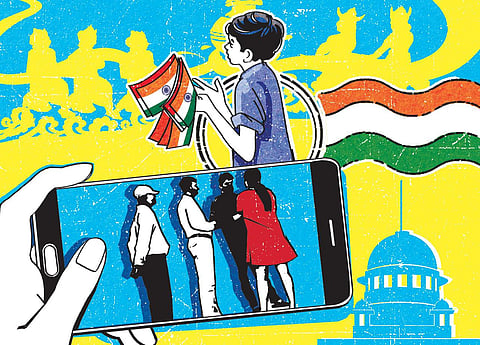

In the Hindu myth of samudra manthan, when the ocean is churned, it expels both amrit (nectar that promises immortality) and vish (legal poison that holds the threat to destroy creation). Without getting distracted by details of how Shiva came to the rescue and swallowed the poison that turned his throat blue and how Jayant Indra’s son escaped with the pitcher of amrit denying the daityas their share to keep it exclusive for the devas, we shall do well to reflect on this metaphoric tale in the context of the grand finale of the Azadi ka Amrit Mahotsav.
It is indeed a time of great rejoicing as we celebrate 75 years of independence. India has made great advances in diverse fields since 1947. The people owe it to those who sacrificed their lives during the freedom struggle and they should be gratefully commemorated. At the same time, we can not turn a blind eye to major flaws and failures, fissures in society. This should be a time of honest stock-taking.
A Dalit boy beaten to death in Rajasthan by a teacher allegedly for touching and ‘polluting a pot of water kept for members of upper caste’ should make us all—1.3 billion and more—hang our heads in shame. In a state ruled by the Congress—a party that never tires of boasting its secular, egalitarian, progressive credo—this incident is revolting to say the least. Full-page tricolour adds with the CM’s photo make one’s stomach churn. Of course usual noises are being made—the ‘guilty will be brought to book’, ‘harshest punishment will be meted out’, and ‘the law will take its course’.
Those in power, regardless of the party they belong to—chameleon-like change of colours has made a mockery of anti-defection laws in any case—have lost all credibility. This is not the first such case of casteist prejudice turning murderous. Decades after abolition of princely privileges, a toxic feud mindset continues to wreck the concept of rule of law. Due process stretches over decades and witnesses turn hostile, political power changes hands, and the accused, in many cases, walk out free. Most, protected by powerful patrons, are released on bail to live their ‘normal’ barbaric lives. The brutalised, mostly poor and Dalit/tribals, are scarred for life, even if they survive.
At times, the Supreme Court intervenes and justice appears to be done—transparently. Another recent incident, though it didn’t result thankfully in loss of life, should make us think hard about the price we pay for constantly celebrating on command. A foul-mouthed goon flaunting his affiliation with the ruling party in Uttar Pradesh vulgarly abused a woman—a fellow resident in an upmarket residential society, pushed her outraging her modesty, and was caught on camera doing all this. Then he fled and remained incognito when the police under pressure registered cases against him. Now, the ‘community’ he belongs to has risen almost in revolt against political vendetta.
The honour of the entire community has been sullied. The local MP is being branded a villain. To cut a long story short, how long are we going to suffer this assault on rule of law? Why should the mobs of musclemen useful to their political masters be allowed to interfere with police investigation or court proceedings? CM Adityanath has become famous for the Yogi model to tame outlaws. The bulldozers he dispatches to demolish the dens of goons, who dare his might, are no less dreaded than ED, CBI and other Central agencies raids. Whether this man was a small-time neta or a big-time local racketeer is besides the question. Prima facie, the evidence against him is overwhelming. When the bulldozers razed his unauthorised construction, suddenly his supporters were reminded of ‘due process’ not being followed. ‘Equality before law of bulldozer’ wasn’t an acceptable concept.
Fetters of caste and community and sectarian hate will not disappear as long as unreformed electoral politics holds sway. Add corruption (again tolerated and protected by vested interests of a particular caste, community or religion) and we have a most explosive brew. The murderous attack on Salman Rushdie reminds us that passage of time is no guarantee that wounds will heal on their own. Blasphemy and freedom of speech are no less life-threatening in India today than in New York or Paris.
The PM has a gift for inspirational rhetoric. As the curtains came down on the Amrit Mahotsav, he shared his vision for coming decades as a run-up to an even more glorious centenary celebration of independence. The future appeared rainbow-hued even on a day overcast with dark clouds. Many of us will not be around in 2047. The aspirational young today would have become middle-aged—many with their dreams unfulfilled. It will be very sad if we haven’t drained the vish out of our minds to heal the body politic.
Pushpesh Pant
Former professor, Jawaharlal Nehru University
pushpeshpant@gmail.com